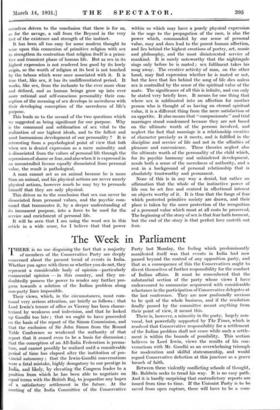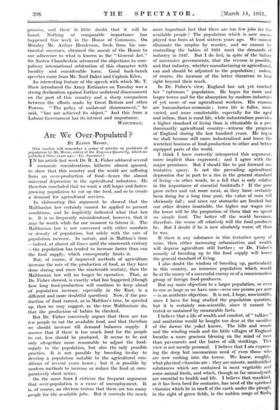The Week in Parliament T HERE is no use disguising the
fact that a majority of members of the Conservative Party are deeply concerned about the present trend of events in India. Whether you agree with them or whether you do not, they represent a considerable body of opinion—particularly commercial opinion in this country, and they un- doubtedly possess the power to render any further pro- gress towards a solution of the Indian problem along non-party lines impossible.
Their views, which, in the circumstances, must com- mand very serious attention, are briefly as follows : that Lord Irwin's tenure of office as Viceroy has been charac- terized by weakness and indecision, and that he locked up Gandhi too, late ; that we ought to have proceeded on the basis of the report of the Simon Commission, and that the exclusion of Sir John Simon from the Round Table Conference so weakened the authority of that report that it ceased even to be a basis for discussion ; that the conception of an All-India Federation is prema- ture, and cannot possibly be realized until a considerable period of time has elapsed after the institution of pro- vincial autonomy ; that the Irwin-Gandhi conversations were a fatal mistake, highly derogatory to our prestige in India, and likely, by elevating the Congress leader to a position from which he has been able to negotiate on equal terms with the British Raj, to jeopardize any hopes of a satisfactory settlement in the future. At the .meeting of the India Committee of the Conservative Party last Monday, the feeling which predominantly manifested itself was that events in India had now passed beyond the control of any opposition party, and that as a consequence of this the Conservatives ought to divest themselves of further responsibility for the conduct of Indian affairs. It must be remembered that the substantial section of the party whose views I have endeavoured to summarize acquiesced with considerable reluctance in the participation of Conservative delegates at the last conference. They are now profoundly anxious to be quit of the whole business, and if the resolution finally passed by the committee meant anything from their point of view, it meant this.
There is, however, a minority in the party, largely non- vocal, but powerfully supported by The Times, which is resolved that Conservative responsibility for a settlement of the Indian problem shall not cease while such a settle- ment is within the bounds of possibility. This section believes in Lord Irwin, views the results of his con- versations with Mr. Gandhi as an overwhelming triumph for moderation and 'skilful statesmanship, and would regard Conservative defection at this juncture as a grave breach of faith.
Between these violently conflicting schools of thought, Mr. Baldwin seeks to tread his way. It is no easy path. And it is hardly surprising that contradictory reports are issued from time to time. If the Unionist Party is to be saved from open rupture, there will have to be a com- promise, and there is little doubt that it will be found. Nothing of comparable importance has happened this week in the House of Commons. Ori Monday Mr. Arthur Henderson, fresh from his con- tinental successes, obtained the assent of the House to our adherence to what is known as the " General Act." Sir Austen Chamberlain advanced the objections to com- pulsory international arbitration of this character with lucidity - and considerable force. Good back-bench speeches came from Mr. Noel Baker and Captain Eden.
An interesting feature of the speech with which Mr. T. Shaw introduced the Army Estimates on Tuesday was a strong declaration against further unilateral disarmament on the part of this country and a sharp comparison between the efforts made by Great Britain and other Powers. " The policy of unilateral disarmament," he said, "has not achieved its object." And this from a Labour Government has its interest and importance.
WATCIIMA1,Z4
























































 Previous page
Previous page